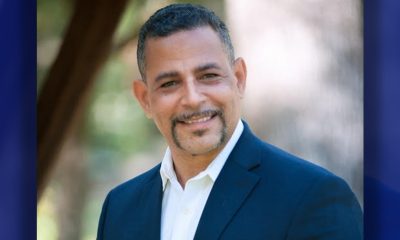Crime
Transgender Community Rallies After Homicide in Prince George’s
THE AFRO — The investigation into the apparent homicide of a transgender woman in Fairmount Heights continues in Prince George’s County. Ashanti Carmon, 27, of Alexandria, Va. was fatally shot several times reportedly after an evening out with friends on March 30.
By Mark F. Gray
The investigation into the apparent homicide of a transgender woman in Fairmount Heights continues in Prince George’s County. Ashanti Carmon, 27, of Alexandria, Va. was fatally shot several times reportedly after an evening out with friends on March 30.
According to a statement from the Prince George’s County Police Department, Fairmount Heights Police responded to reports of gunshots fired near the 5000 block of Jost Street in the vicinity of Eastern Avenue N.E., near the D.C.- Maryland border, around 6:30 a.m. When officers arrived on the scene they found Carmon’s body filled with multiple gunshot wounds and she was pronounced dead on the scene.
In an emotional interview Carmon’s fiancé, Phillip Williams, told NBC-4 in Washington there was no reason why someone would want to hurt her. Williams said they had gone to a movie and dinner on Friday night, and he hadn’t heard from Ashanti since she went out with her friends while he was at work.
“Until I leave this earth, I’m gonna continue on loving her, in my heart, body and soul,” Williams said. “She did not deserve to leave this earth so early. Especially in the way she went out, she did not deserve that. … I’m gonna miss her face every day. I’m gonna miss her smile. I’m gonna miss every inch of her.”
Police have yet to make any arrests in the case while Carmon’s loved ones and the transgender community have rallied around this horrific tragedy. A candlelight vigil was held to honor her memory on April 2. It was not only a time for the D.M.V.’s transgender community to mourn it was a call to action against a rash of hate crimes directed toward them.
“I can’t call it hate. I don’t know what happened. I don’t know what led up to it,” said trans activist Earline Budd Metro Weekly. All we can do is plead that someone comes forward with information. I believe that eventually something will come out that will shed more light on what happened.”
A major problem facing this community is gentrification. With D.C. and Maryland in the midst of their transformations, many of the places where members of the gay, lesbian and transgender community would socialize in have been converted into new establishments, which has diminished the number of safe social sanctuaries for these residents.
Budd noted that while there have been a history of anti-transgender attacks or robberies in the Eastern Avenue corridor in recent years, this community has no place to congregate in the D.C. metro area, and therefore end up meeting in public places, like along the Eastern Avenue corridor where Carmon’s apparent murder took place.
“We don’t have anywhere in this city now to go,” Budd said. “So the streets are the place where we congregate with our friends and sometimes we are preyed upon.”
According to the Human Rights Campaign’s 2018 Anti-Trans Violence Report at least 128 transgender and gender-expansive individuals have been killed in the U.S since 2013. However, 2017 and 2018 saw the largest spike toward transgender Americans with 51 targeted attacks that were fatal nationwide.
Transgender people of color have been targeted the most. In the past six years of reporting at least 110 victims were people of color, including 95 who identified themselves as Black or African American.
“With the administration we have now, the Trump-Pence administration, it has done nothing for us as transgender people,” Budd added. “In fact, it more or less validates that it’s all right to kill us, to do anything you want to us, because we are transgender people.”
This article originally appeared in The Afro.
Activism
Oakland Post: Week of May 21 – 27, 2025
The printed Weekly Edition of the Oakland Post: Week of May 21 – 27, 2025

To enlarge your view of this issue, use the slider, magnifying glass icon or full page icon in the lower right corner of the browser window.
Bo Tefu
California Assembly Passes Bill to Strengthen Penalties for Soliciting Minors
The revised version of Assembly Bill 379, authored by Assemblymember Maggy Krell (D-Sacramento), now allows prosecutors to file felony charges against adults who solicit sex from a 16 or 17-year-old, provided the accused is three or more years older than the minor. If the offender is within three years of the minor, the charge would remain a misdemeanor.

By Bo Tefu, California Black Media
The California State Assembly has agreed to amend a controversial bill that would increase penalties for adults who solicit sex from minors ages 16 or 17, following a wave of criticism from Republicans and concerns raised by Gov. Gavin Newsom.
The revised version of Assembly Bill 379, authored by Assemblymember Maggy Krell (D-Sacramento), now allows prosecutors to file felony charges against adults who solicit sex from a 16 or 17-year-old, provided the accused is three or more years older than the minor. If the offender is within three years of the minor, the charge would remain a misdemeanor.
“From a prosecutor’s standpoint, this bill strengthens California law and gives us the felony hammer to prosecute the creeps that are preying on teenagers,” Krell said in a statement supporting the amended bill.
The new amendments also include provisions for a state grant program aimed at improving the prosecution of human trafficking and sex trafficking cases, as well as a support fund for survivors partially funded by increased fines on businesses that enable or fail to address human trafficking.
The bill faced significant opposition last week after the Assembly removed a provision that would have treated solicitation of 16 and 17-year-olds as a felony for all offenders.
Activism
BOOK REVIEW: The Afterlife of Malcolm X
Betty Shabazz didn’t like to go to her husband’s speeches, but on that February night in 1965, he asked her to come with their daughters to the Audubon Ballroom in New York. Did Malcolm X sense that something bad would happen on that night? Surely. He was fully aware of the possibility, knowing that he’d been “a marked man” for months because of his very public break with the Nation of Islam.

By Terri Schlichenmeyer
Author: by Mark Whitaker, c.2025, Simon & Schuster, $30.99, 448 pages
Who will remember you in fifty years’ time?
A handful of friends – at least those who are still around – might recall you. Your offspring, grandkids, and greats, maybe people who stumble upon your tombstone. Think about it: who will remember you in 2075? And then read “The Afterlife of Malcolm X” by Mark Whitaker and learn about a legacy that still resonates a half-century later.
Betty Shabazz didn’t like to go to her husband’s speeches, but on that February night in 1965, he asked her to come with their daughters to the Audubon Ballroom in New York. Did Malcolm X sense that something bad would happen on that night? Surely. He was fully aware of the possibility, knowing that he’d been “a marked man” for months because of his very public break with the Nation of Islam.
As the news of his murder spread around New York and around the world, his followers and admirers reacted in many ways. His friend, journalist Peter Goldman, was “hardly shocked” because he also knew that Malcolm’s life was in danger, but the arrest of three men accused of the crime didn’t add up. It ultimately became Goldman’s “obsession.”
Malcolm’s co-writer for The Autobiography of Malcolm X, Alex Haley, quietly finished the book he started with Malcolm, and a small upstart publishing house snatched it up. A diverse group of magazines got in line to run articles about Malcolm X’s life, finally sensing that White America “’needed his voice even more than Blacks did.’”
But though Malcolm X was gone, he continued to leave an impact.
He didn’t live long enough to see the official founding of the Black Panther Party, but he was influential on its beginning. He never knew of the first Kwanzaa, or the triumphs of a convert named Muhammad Ali.
Malcolm left his mark on music. He influenced at least three major athletes.
He was a “touchstone” for a president …
While it’s true that “The Afterlife of Malcolm X” is an eye-opening book, one that works as a great companion to the autobiography, it’s also a fact that it’s somewhat scattered. Is it a look at Malcolm’s life, his legacy, or is it a “murder mystery”?
Turns out, it’s all three, but the storylines are not smooth. There are twists and tangents and that may take some getting used-to. Just when you’re immersed, even absorbed in this book, to the point where you forget about your surroundings, author Mark Whitaker abruptly moves to a different part of the story. It may be jarring.
And yet, it’s a big part of this book, and it’s essential for readers to know the investigation’s outcome and what we know today. It doesn’t change Malcolm X’s legacy, but it adds another frame around it.
If you’ve read the autobiography, if you haven’t thought about Malcolm X in a while, or if you think you know all there is to know, then you owe it to yourself to find “The Afterlife of Malcolm X.”
For you, this is a book you won’t easily forget.
-

 Activism4 weeks ago
Activism4 weeks agoAI Is Reshaping Black Healthcare: Promise, Peril, and the Push for Improved Results in California
-

 Activism4 weeks ago
Activism4 weeks agoBarbara Lee Accepts Victory With “Responsibility, Humility and Love”
-

 Activism4 weeks ago
Activism4 weeks agoESSAY: Technology and Medicine, a Primary Care Point of View
-

 Activism4 weeks ago
Activism4 weeks agoFaces Around the Bay: Author Karen Lewis Took the ‘Detour to Straight Street’
-

 Arts and Culture4 weeks ago
Arts and Culture4 weeks agoBOOK REVIEW: Love, Rita: An American Story of Sisterhood, Joy, Loss, and Legacy
-

 Activism4 weeks ago
Activism4 weeks agoNewsom Fights Back as AmeriCorps Shutdown Threatens Vital Services in Black Communities
-

 #NNPA BlackPress4 weeks ago
#NNPA BlackPress4 weeks agoThe RESISTANCE – FREEDOM NOW
-

 Activism4 weeks ago
Activism4 weeks agoTeachers’ Union Thanks Supt. Johnson-Trammell for Service to Schools and Community




















































1 Comment